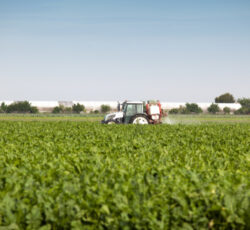 Soil is a crucial component for successful agricultural practices. It provides a medium for plant growth, nutrients, and water absorption. However, soil can also harbor harmful pests, diseases, and weed seeds that can jeopardize crop yields. To ensure healthy crops and maximize productivity, soil fumigation has become an essential practice in agriculture. In this blog post, we will explore the importance of soil fumigation in agriculture and its benefits for farmers.
Soil is a crucial component for successful agricultural practices. It provides a medium for plant growth, nutrients, and water absorption. However, soil can also harbor harmful pests, diseases, and weed seeds that can jeopardize crop yields. To ensure healthy crops and maximize productivity, soil fumigation has become an essential practice in agriculture. In this blog post, we will explore the importance of soil fumigation in agriculture and its benefits for farmers.
1. Pest and Disease Control:
One of the primary reasons for soil fumigation is pest and disease control. Soil-borne pests like nematodes, fungi, bacteria, and weeds can cause significant damage to crops, leading to reduced yields or even crop failure. Soil fumigation involves the application of chemical fumigants that penetrate the soil, effectively controlling these harmful organisms. Fumigants target pests and diseases at various stages of their life cycles, minimizing their impact on crops. By eliminating or reducing these threats, farmers can secure healthy plants and improve overall crop productivity.
2. Improved Crop Performance:
Healthy soil is essential for optimal crop performance. When soil is infested with pests and diseases, plants struggle to absorb nutrients and water, leading to stunted growth, nutrient deficiencies, and poor yield. Soil fumigation helps create a healthy growing environment by eliminating or reducing harmful organisms, ensuring that plants have the best chance of thriving. With healthier plants and improved nutrient absorption, farmers can expect higher crop yields and better quality produce.
3. Weed Management:
Weeds compete with crops for essential resources such as sunlight, water, and nutrients. They can quickly multiply and spread, choking crops and reducing yields. Soil fumigation plays a vital role in weed management by targeting weed seeds and preventing their germination. Chemical fumigants can suppress weed seeds, significantly reducing weed pressure in fields. By controlling weed populations through fumigation, farmers can minimize the need for expensive and labor-intensive manual or chemical weed control methods.
4. Increased Efficiency:
Efficiency is crucial in modern agriculture where farmers are constantly seeking ways to optimize their operations. Soil fumigation offers increased efficiency in several ways. Firstly, fumigation is a one-time treatment that can provide long-lasting pest control benefits. This saves farmers time and resources in repeated pest control applications throughout the growing season. Secondly, fumigation can be applied to large areas of land, covering a significant portion of agricultural fields in a single treatment. This fast and widespread application maximizes efficiency and allows farmers to focus on other critical farming practices.
5. Disease Prevention and Transmission:
Certain soil-borne diseases pose a significant threat to crops. These diseases can spread rapidly within a field, leading to severe crop losses and economic impact. Soil fumigation can play a crucial role in disease prevention and transmission control. By eliminating pathogens from the soil, fumigation minimizes the risk of disease outbreaks and spread. Preventing disease transmission is essential not only for current crop health but also for future planting seasons, as pathogens can persist in soil and affect subsequent crops. Proper soil management through fumigation helps farmers maintain disease-free fields and ensure the long-term health of their agricultural lands.
6. Environmental Considerations:
While soil fumigation is a powerful tool in agriculture, it is important to consider its potential impact on the environment. Farmers and agricultural professionals must follow strict regulations and guidelines for the safe and responsible use of fumigants. Proper application techniques, dosage control, and adherence to recommended waiting periods before planting are crucial to minimize any adverse effects on the environment. Implementing best practices and staying informed about new technologies can help farmers mitigate potential risks and ensure sustainable agricultural practices.
Conclusion:
Soil fumigation is a vital practice in modern agriculture. It helps control pests, diseases, and weeds, improving crop performance and yield. By applying fumigants to the soil, farmers create a healthy growing environment, increasing efficiency and enhancing disease prevention. However, it is important to prioritize responsible and sustainable practices when using soil fumigation methods. By doing so, farmers can benefit from healthier crops, increased productivity, and long-term soil health, all while minimizing potential risks to the environment.
Got Questions? Let Us Help!
Founded in 1992, Custom Orchard Fumigation was created by farmers for farmers. We take great pride in providing soil fumigation services to farmers throughout the state. We can also help growers find other services to help in growing their crops. We also provide all paperwork for our services to ensure all regulations are met. Our founder, Chris Ford, has a background in Forest Management, and we are conscious of reducing the environmental impact on the soil and surrounding areas of your plot. Custom Orchard Fumigation invites you to visit our website or give us a call today!
